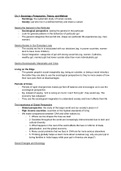Summary
Summary Soci 101: Social Interaction and Culture Summarized Textbook Notes of All the Readings
Includes summaries of all the readings in UBC's Soci 101 class with Professor Christopher Mackenzie. 70 pages in total. Readings include: chapters 1- 3, ch. 4.1-4.6, ch. 5.1-5.2, ch. 6, ch. 8, ch. 9.1-9.2, chapters 10-11, ch. 12.4- 12.6, ch. 13.1-13.3, ch. 14.1- 14.3, and ch. 16
[Show more]



